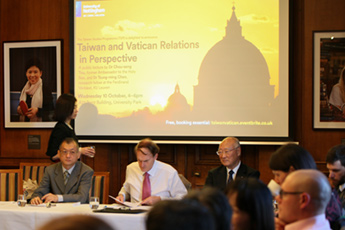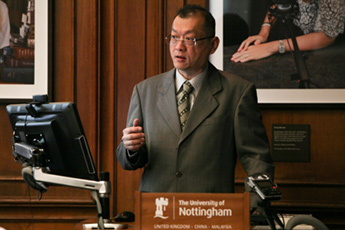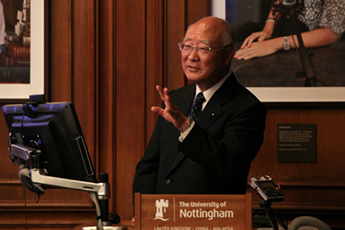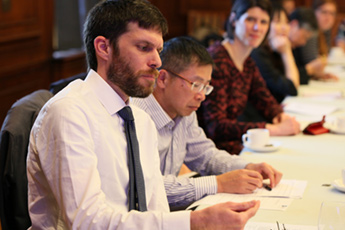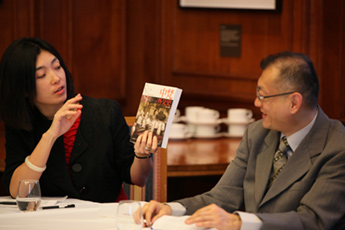The Taiwan Studies Programme (TSP) is delighted a to announce a public lecture by Dr. Chou-seng Tou Former Ambassador to the Holy See and Dr Tsung-ming Chen, Research fellow at the Ferdinand Verbiest, K. U. Leuvenwho will both be discussing Taiwan and Vatican Relations in Perspective.
Abstract for Dr Chou-seng Tou
The Republic of China (ROC) established diplomatic relationship with the Holy See in 1942. The cordial relations between the two countries last till today; albeit all the other European countries having switched their recognition from Taipei to Beijing. Why does the Holy See maintain this unique position in Europe?
The Holy See adopts a one China policy and considers the Government of the ROC in Taiwan as representing China, and this is reflected in the Latin name of its embassy in Taipei “Nuntiatura Apostolica in Sinis”. Does this mean that the Vatican ignores the existence of the People’s Republic of China (PRC)? There are more than 10 million Catholics in China, but the Catholic Church is divided. The majority of Catholics remain loyal to the Pope. Despite the persecution and oppression they suffered, they still refuse to join in the Chinese Patriotic Catholic Association (CPCA) which is an organization established in 1957 by the PRC's Religious Affairs Bureau to supervise mainland China's Catholics. They are thus called Underground Churches.
The thorniest issue is the appointment of bishops. According to the Catholic Hierarchy, all bishops are appointed by the Pope. It is a papal prerogative not subject to any challenge. For the last two decades, the Vatican has spared no effort in removing obstacles and keeps the door open in her dialogue with Beijing with a view to normalizing their relationship.
Several months ago, the mass media reported that the Vatican has agreed to legalize illegitimate Chinese bishops and found a solution to the appointment of bishops and that the Vatican and Beijing will normalize their relations soon. Contrary to all the speculation, the spokesman of the Vatican made an announcement at the end of March 2018, that there is no immediate agreement to be signed with Beijing. Why did the Vatican make such an announcement? What has happened in between?
Abstract for Dr Chen Tsung-ming
While studying the contemporary history of the Sino-Vatican relations during the first three quarters of the 20th century, we can sum up some characteristics of the Holy See’s diplomacy towards the China Problem (1912-1949) and PRC - Taiwan Issue (since 1949). Our exploration in these characteristics will help us not only to know better the Vatican’s position toward the China Problem in the past and to discover the face of the Sino-Vatican relations today, but also to be served as a reference for all in observing the reactions of the R.O.C. in Taiwan with regard to a series of negotiations and a possible rapprochement between PRC and Vatican.
Speakers biography
Dr. Chou-seng Tou was born in 1942 in Guizhou, China . He graduated from the College of law, National Taiwan University and received Doctor Degree in International Law at University of Paris II, France. He was fellow at the Center for International Affairs of Harvard University (1988-89). Back from Paris, He entered in foreign services. He served successively as Section Chief of the Department of European affairs, Deputy Director General of Department of Treaty and Legal Affairs, Chief of Protocol, Director General of Department of North American Affairs and Vice Minister of Foreign Affairs. He has also served as Deputy Representative of Taipei Economic and Cultural Office (TECO) in Brussels, Belgium, Representative of TECO in Athens, Greece, Director General of TECO in Chicago, USA , Ambassador to the Republic of Senegal and Ambassador to the Holy See. In an academic field, he was adjunct associate professor at Soochow University and adjunct professor at the Research Institute of European Studies, Tamkang University in Taipei. After his retirement from foreign services, he was chair professor at Fu Jen Catholic University. He is currently adjunct chair professor at Fu Jen Catholic University. He has published several articles and two books, entitled “The External Relations of the European Economic Community” in 1987 and “The International Status of the Holy See and its Relations with China” in 2014.
Dr Tsung-ming Chen, is research fellow at the Ferdinand Verbiest, K. U. Leuven, Belgium. He obtained Ph.D degree in History at Université Lumière Lyon 2, France in December 2006. Specialized in the history of Catholicism in China and Taiwan of the 19th and 20th centuries, he particularly works in the fields of the Catholic missions, the French protectorate in China, the relationship between Church and State and Scheut Mission in Inner Mongolia. He is interested in the history of the Vatican diplomacy as well. He published the book in January 2016: Chen, Alexandre Tsung-ming (陳聰銘), 《中梵外交史—兩岸與教廷關係[1912-1978]》 (The History of the Sino-Vatican Diplomatic Relationship : the Relations of Both Sides of the Strait with the Holy See / Zhong Fan waijiaoshi – liang an yu Jiaoting guangxi), Taipei, Guangqi wenhua, 2016. He also published more than 40 papers in academic journals, book chapters, divers conference presentations and seminars.
Listen to the podcast.
Images from the event
